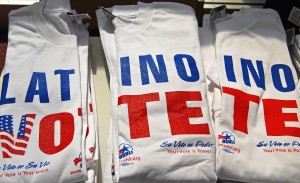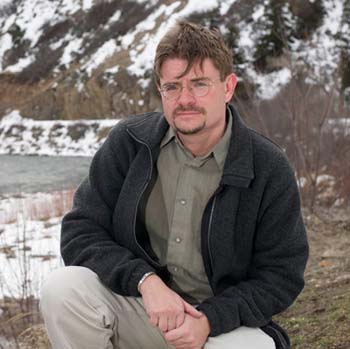 The Latino vote has never been as important or as heavily sought as in this election. That’s particularly true in the West, where critical battleground states also have large Hispanic populations.
The Latino vote has never been as important or as heavily sought as in this election. That’s particularly true in the West, where critical battleground states also have large Hispanic populations.
“The Latino vote is going to elect the next president,” says Federico Peña, the former Denver mayor and member of President Clinton’s cabinet who serves as co-chairman of Obama’s campaign.
Like Peña, many Latino leaders say the next president won’t take the White House without them. Yet even some of Democratic presidential candidate Barack Obama’s supporters say he hasn’t done enough to win over Latino voters.
Obama is doing “not well at all” in attracting Latino voters, says Juan Andrade, president of the United States Hispanic Leadership Institute. Western states like Colorado, New Mexico and Arizona are up for grabs, and Andrade says, those states also have large Hispanic populations.
“I don’t think he can win Colorado and Nevada and Arizona and New Mexico without the Latino vote,” says Lawrence Martinez, vice president of the Labor Council for Latin American Advancement.
The increasing attention paid to Latino voters mirrors not only the growth of the Hispanic population, but also the narrowing of the American electorate. As political strategists court every vote in a string of narrowly-divided presidential races, every segment in ever state becomes critical.
Michelle Obama spent Wednesday morning pumping up the Hispanic Caucus with chants of “Sí se puede!” The words are a translation of Obama’s campaign motto, “Yes we can!” But they also harken back to the rallying cry of Chicano activists.
On Wednesday night, Sen. Ken Salazar, D-Colo., a prominent Hispanic Senator, is pegged to deliver Obama’s nomination speech, one night after Hillary Clinton, who enjoyed strong support among Latinos, made a plea for her supporters to back Obama.
“This nation is going to go the way Florida, New Mexico, Nevada and Colorado go, and that’s the Latino vote,” says New Mexico Gov. Bill Richardson, a former presidential candidate who backed Obama after dropping out of the race.
A recent Pew Hispanic Center survey of 2,015 Hispanic voters found Latinos supported Obama over McCain 66 percent to 23 percent. It found Latinos had “moved sharply into the Democratic camp” over the last two years, “reversing a pro-GOP tide” earlier.
Obama faces a number of hurdles in winning the Latino vote, though. Some who backed Clinton may not cast votes for Obama. Others will back McCain, who has had strong Latino support in his home state of Arizona. Many Latino residents aren’t citizens, even if they’re legal residents. Some who are citizens aren’t registered to vote, prompting a number of voter registration initiatives in Latino communities.
Both Obama and McCain have launched efforts aimed at attracting Latino voters that dwarf those of past presidential campaigns. Federico de Jesus, director of Hispanic communications for Senate Majority Leader Harry Reid, D-Nev., estimates the Obama campaign is spending $20 million on Latino outreach, more than double what Democrat John Kerry and President Bush spent combined four years ago.
“Before the road to the White House could have been Ohio, Pennsylvania, Nevada. I think (this time) it’s going to be the Southwestern United States and Florida, and the Latino vote is going to be decisive.”
McCain’s strategy includes a massive advertising campaign aimed at Latinos in the battleground states of Colorado, New Mexico and Nevada. Obama plans to roll out Latino versions of his Camp Obama volunteer training sessions in the same states, plus Florida.
 Peña dismisses critics who say the Obama campaign has been slow to court Latinos.
Peña dismisses critics who say the Obama campaign has been slow to court Latinos.
“It’s a misconception,” he says, “because I’ve been involved over a year.”
Obama’s Latino supporters look to Peña to help deliver the Latino vote. Peña claims primary victories among Latino voters in Colorado and some other key states, but he admits losing out to Clinton in other key spots, including California, Texas, Nevada and Puerto Rico.
“Since the primary we’ve beefed up our operation,” Peña says.
Some Hispanic Democratic leaders believe Obama’s personal story will win over Latinos. Leticia Van de Putte, a Texas state senator and co-chairwoman of the Democratic National Convention, credits Michelle Obama’s speech with helping put a personal face on Obama, a move she thinks will help lure Latino voters.
“I think all we have to do is to know Senator Obama,” she says. “To know him and to know his family.”
Sen. Salazar says Obama’s personal story will resonate with Latinos. “I think he needs to just tell his story of struggle,” he says.
His brother, Rep. John Salazar, D-Colo., agrees, saying Obama needs to represent himself as a “positive role model.”
The Salazar family, however, has made some unusual headlines recently. Their cousin Silverio Salazar, a longtime Democratic activist in Pueblo, has resigned his party posts complaining that Obama is ignoring Democrats. “He doesn’t even know we’re around,” he told reporters.
Rep. John Salazar, writes off the flap as “just a personality conflict.”
“Latinos are really excited about Barack Obama,” he says. “They see him as a new opportunity.”
The issue strikes at a chord within the Hispanic community, though.
“I think there’s still a little skepticism about what has he done for Hispanics? What has he done for the country?” says Roger Molinar, of Denver, regional director for the National Image Inc., a Latino civil rights organization. He worries Latinos simply won’t vote.
Latino leaders say that could destroy Obama’s chance at victory.
“This is the key to winning the White House,” Andrade says.

